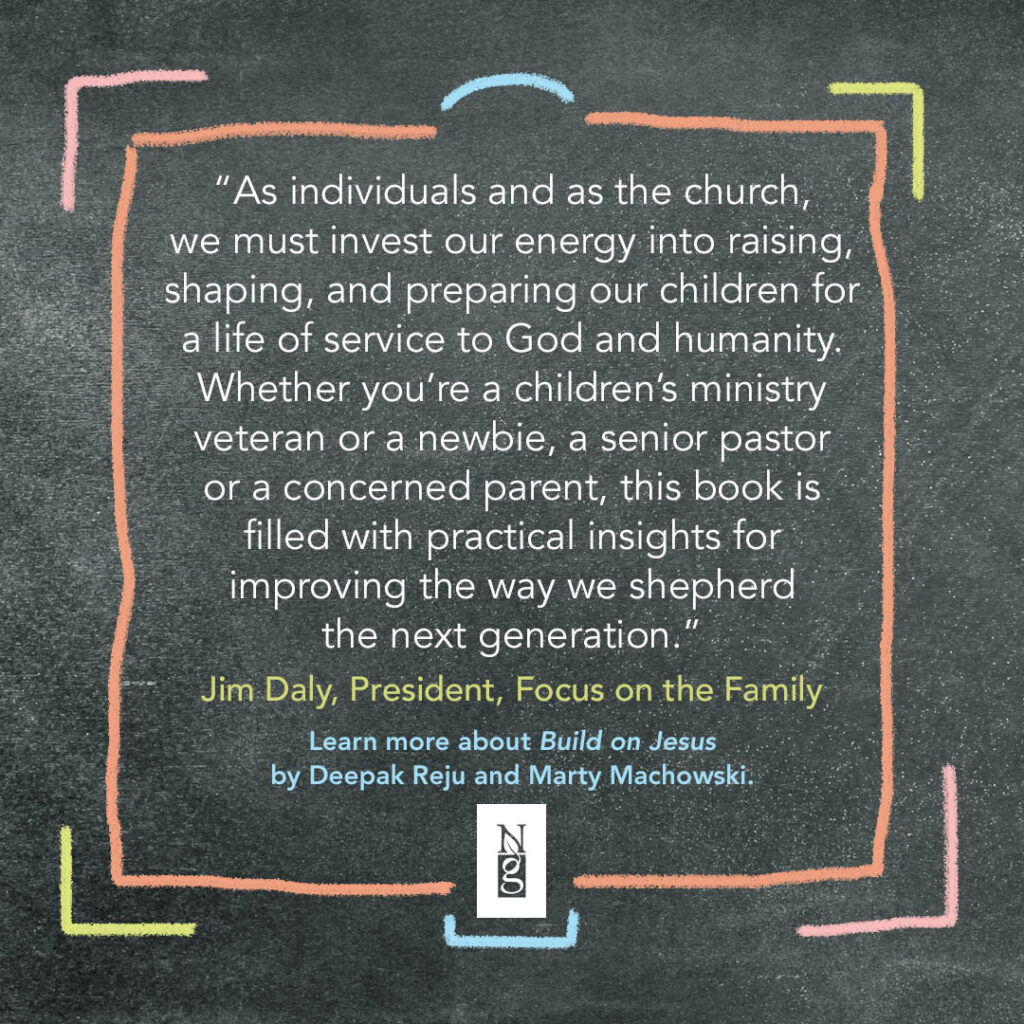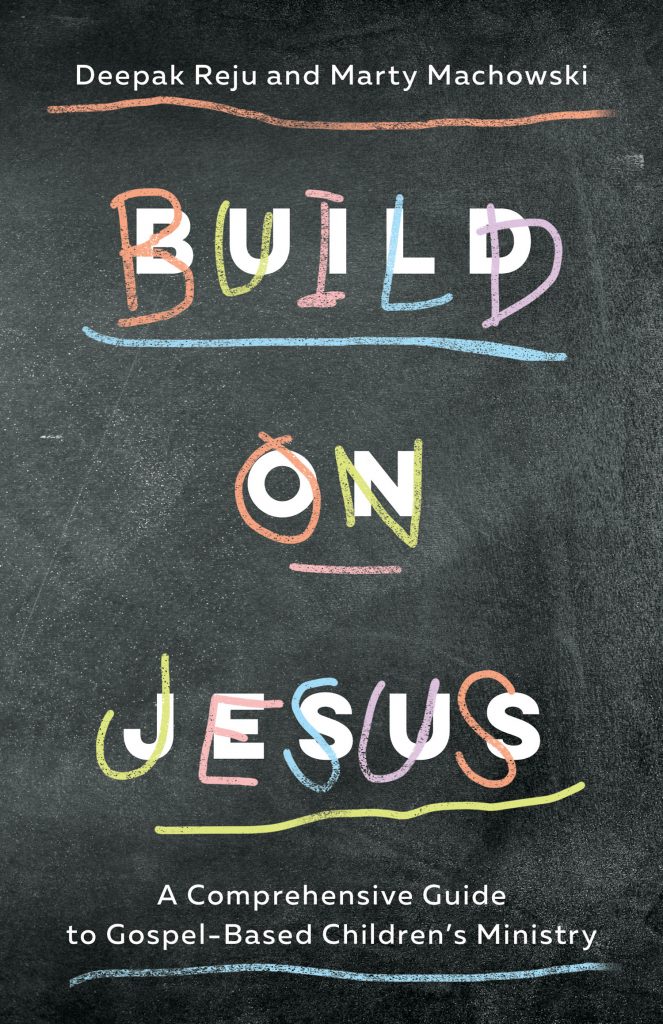Anyone who has tried it, even for a day, knows that children’s ministry is challenging. Pastors Deepak Reju and Marty Machowski have been in the trenches and they want to help. Drawing on decades of family ministry experience, they have a passion to help children’s ministry directors, pastors, and volunteers remember the “why” of children’s ministry and gain a fresh vision for “how” to disciple the next generation. That’s why they wrote, Build on Jesus: A Comprehensive Guide to Gospel-Based Children’s Ministry.
Between recruiting volunteers, organizing materials, setting up safety policies, and managing the many needs, it’s easy to become overwhelmed, discouraged, and wonder if the ministry is even effective. Children’s ministry is more than just providing safe childcare so that parents can attend worship services. It’s about raising up children who we pray will one day become faithful believers who love the Lord, stand firm in the gospel, treasure Scripture, and have a heart for others. Reju and Machowski want to see generations of godliness raised up in our churches. These goals can only be met if the whole church prioritize time and energy into disciple-making and sets proactive policies for children’s safety.
We interviewed the authors about Build on Jesus and the essentials of a gospel-based children’s ministry.
Q: How did the two of you come together to write Build on Jesus? Tell us a little bit about your experience in children’s ministry.
Deepak: I asked Marty if he’d join me on this project. I figured our combined children’s ministry experience (I have fifteen years under my belt and Marty has thirty-two) would create a better, more powerful book!
Marty: I was glad to join Deepak in writing this book, as I knew that we both shared the same vision for reaching children with the gospel.
Q: Who did you write this book for? Who will benefit most from reading it?
Deepak: We wrote Build on Jesus because children’s ministry directors (CMDs) often don’t have a guidebook for their work. We’ve written a gospel-centered play-by-play manual for them. In most churches, the CMDs haven’t been trained or earned a degree in children’s ministry. They’ve been thrown into the job, and they’ve had to figure things out in a trial by fire.
However, we think pastors, parents, teachers, childcare workers, or really anyone who serves in children’s ministry in a local church will also benefit from reading the book. This is a book that a children’s ministry director can go through with their team to help answer the question, “Where can we grow and improve our ministry to children?”

Q: What are some of the biggest challenges you tackle in Build on Jesus?
Marty: Children’s ministry comes with particular challenges. Especially is this day and age, child safety is key. We talk about how to keep your kids safe and how to put together a child protection policy, which includes recognizing possible sex offenders.
We also address volunteer recruitment, care of volunteers, classroom management, emergency response plans, building a partnership with parents, and much more.
Q: What are the three Ps of children’s ministry that the book is divided into?
Deepak: We start by reviewing the priorities of children’s ministry. Every ministry has priorities—the values, governing principles, and essential components foundational to our goals. We define these matters to help our ministry remain focused on the essential elements: teaching the Bible, valuing children, and focusing on God’s mission.
In part 2, we look for people. At the center of God’s redemptive plan is a rescue operation—God uses fallen, broken sinners and sufferers (like you and me) to inspire, instruct, and model truth to little hearts. In this section, we take a look at the unique roles of the pastor, children’s ministry director, volunteers, and parents, and how these roles work together to raise the next generation.
In the last section, we’ll tackle the practical aspects of children’s ministry. Too often we rush to the pragmatic aspects of ministry first, without building a proper foundation. But that’s not what we’ve done. After we’ve built our biblical foundations, and recruited the right people, then we’re ready to consider the hands-on, concrete aspects children’s ministry—things that must get done to make it all work.
Q: What three priorities should every children’s ministry have?
Marty: Our foundation is key. We want our kids to stand on stable building blocks. These three priorities offer a rock-solid platform for any gospel-centered children’s ministry:
- Teach the Bible. The authority of the Bible and the gospel are the cornerstones on which we build our entire children’s ministry. Everything we do is shaped and defined by these two values, including the gospel-rich curriculum we teach to our children.
- Value the Children. Because Jesus valued children, so we also love and cherish them. That leads us to teach truth to little hearts and model the gospel in community for them.
- Focus on the Mission. We want all of our kids to support the Great Commission and reach the world with the gospel, whether that’s teaching a Sunday school class for thirty years in their local church or going overseas as a missionary.
Q: Why does the children’s ministry often become a lower priority for the pastor? What can a church’s leadership do to give children’s ministry the attention it needs and not be delegated to someone else?
Deepak: Some pastors are just maxed out and overwhelmed with their work. Other pastors don’t see it as all that important. Regardless of the reason, the most basic thing a pastor can do is set aside regular time to meet up with the children’s ministry director. In addition, the pastor sets out a vision for where children’s ministry is headed, problem solves with the children’s ministry director, sets healthy limits for the children’s ministry staff and volunteers, engages in hard conversations, and offers loads of encouragement.
Marty: The reality is that pastors need the help of a children’s ministry director to take care of the nuts-and-bolts administration for children’s ministry, but the children’s ministry director needs the pastor to help cast a vision and provide the encouragement needed to sustain the ministry. It is easy to see how a children’s ministry program breaks down with poor administration, but the ministry also suffers when the vision for what they are trying to accomplish is clouded or when the struggles of maintaining a ministry overwhelm the leaders.
Q: What are some things that church members can do to be more supportive of their congregation’s children’s ministry?
Marty: Pray and participate in children’s ministry. Don’t wait to be recruited! Step up and take responsibility for the children in your congregation. View children’s ministry as a mission field. After all, this is the closest unreached people group to your congregation—the kids! We get serve alongside parents in reaching the next generation with the gospel. This isn’t babysitting; this is true gospel work. Church members should own their children’s ministry as if they were reaching out to their own family…because (in fact) they are!
Also check regularly on the spiritual well-being of children’s ministry director. Don’t let him or her burn out. Do whatever you can to take things off their shoulders.
Q: What qualities and qualifications should a children’s ministry director possess?
Deepak: A children’s ministry director (CMD) should have two essential qualities.
First, a children’s ministry director must be a born-again Christian (John 3:3). Let’s say you have a new CMD named Ramona. Ramona should be a godly woman who feverishly and fervently loves Christ. If you’re sticking her in front of your children weekly to model the gospel and Christian faith, you want to make sure she’s got a vibrant faith, not a fledgling one.
Second, a children’s ministry director should be a member of your church. She’s more than a hired gun; she’s God’s child who desperately needs God’s grace. Ramona is a fellow church member who has covenanted to fight for faith and care for these children. You want your children’s ministry’s leaders to be shaped and molded by the preaching in your church. Regular participation in the worship service positions your children’s ministry director to pass on the senior pastor’s vision to the children’s ministry leaders, volunteer team and to the children.
Marty: It’s also important to have qualities and skills that fit with the expectations of a children’s ministry director. The responsibilities of a CMD include:
- Administration
- Taking initiative
- Coordinating curriculum
- Training teachers
- Planning events
- Recruiting new volunteers
- Enforcing policy
Q: How do your congregations encourage volunteer recruitment?
Deepak: You can inspire your church with this gospel opportunity. Many of our children are not Christians. They willingly come along with their parents, listening and participating in the children’s programs. Over the course of many years, this will be the most consistent evangelistic opportunity offered to your church.
You should tell your members that this is an opportunity to grow spiritually. Anytime God asks us to serve others, it’s a chance to deny our selfishness and, in humility, learn to put others first (Philippians 2:3-4). We want to see ministry the way God does—as service to the entire body. When each part of the body does its part, the body grows, as it builds itself up in love (Ephesians 4:16).
Marty: Every parent wants their children to be well cared for and provided with a safe environment. That means your ministry must be adequately staffed. The best person to recruit for your ministry is the senior pastor and/or an elder who oversees the ministry. They can help cast a vision for serving in this vital context.
There is no need to panic, manipulate, or beg for help. Make the needs clear to the church. Remind the members of their commitment to raise these kids together. Pray. And then trust God to bring adequate workers to meet your needs.
Q: What does it mean to have a gospel-based children’s ministry?
Deepak: It means Jesus is the foundation for everything we do. We’re not just here to tell stories, have fun, and offer a moralistic lesson. None of that saves the souls of our children. Only Jesus saves.
It also means we hold the Scriptures—fully inspired and without error—as the Word of God to these children. They are the very words of life.

Q: Can you share some of the practical aspects of children’s ministry that you explore? What are some important areas that need to be addressed but aren’t always at the forefront?
Marty: So much of running a children’s ministry is practical and logistical. We start with choosing the right curriculum and move on to strengthen classroom management and our pursuit of creative excellence in everything we do.
We also look at fire safety, evacuation procedures and live-shooter response training. But really any kind of unpredictable event (earthquake, bomb threat, tornado, etc.) should be planned for if it is likely for your region.
Q: You devote two chapters to child safety. What are the first steps in creating a safe environment?
Deepak: The first step is writing a child-protection policy (CPP). A CPP is a self-imposed set of guidelines that a church comes up with to outline the parameters of a safe environment. You create a policy that outlines best practices for screening teachers and other childcare workers, and you set up policies related to child-teacher ratios, check-in and check-out procedures, safe bathroom environments, and prevention of communicable diseases. If you’re not sure how to write one, we offer extensive material in Build on Jesus.
Sex abusers and predators target churches and other organizations that care for children. If we ignore this painful reality, our children will suffer the consequences. We can’t assume that it won’t happen to us. We must think, plan, and show vigilance to ward off potential abusers.
Q: What final encouragement would you like to offer anyone involved in children’s ministry?
Marty: We want to see generations of godliness. If we don’t teach the gospel to the next generation, then who will carry on the banner? Asaph understood that there is a corporate side to reaching the next generation. The parents carry primary responsibility for discipling children, but in regard to the community Asaph exhorted Israel to join with parents, saying, “We will not hide them from their children, but tell to the coming generation the glorious deeds of the Lord, and his might, and the wonders that he has done.” (Psalm 78:4)
We’re passionate about this because Jesus cares for the little children, so also must we.






